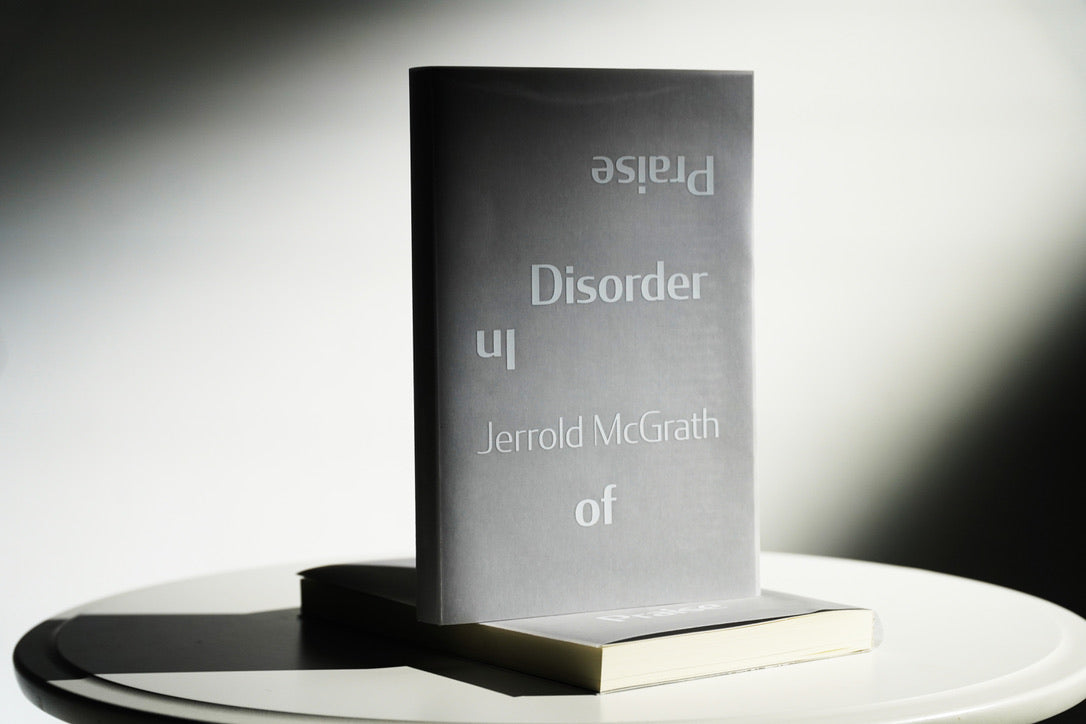UKAI’s first publication, In Praise of Disorder, has been available since spring of 2023. Our Research Lead, Jerrold McGrath, is the author of both the book and this post. It feels good to have it in the world and there is also this strange ache from having it so exposed. The process of completing the 256 pages overwhelmed me for much of the past three years and now that it’s available, I’m left at a bit of a loss as to how to move forward. I hope it finds an audience as it’s something I’m quite proud of.
You can buy a limited edition copy through our website. An e-book version is also available as is a print version through Amazon to facilitate global distribution.
The design of the book and the dust cover was the work of the amazingly talented Nour Bishouty, a multidisciplinary artist and designer based in Toronto. I received editing support from Richard Martin, a writer whose work I had previously admired and who I now get to appreciate as a person and editor as well.
There is a quote that appears at the start of Chapter 5 that I think best captures the intention of my writing and the final product.
But ten centuries of cultural continuity brings with it—among many advantages—the great disadvantage that man believes himself safe, loses the feeling of shipwreck, and his culture proceeds to burden itself with parasitic and lymphatic matter.
— José Ortega y Gasset, “In Search of Goethe from Within”
The first half of the book explores how we’ve come to our current ideas of ‘order’ and how these ideas show up in the culture we have and that we encourage.
Unsurprisingly, there is a fair bit on artificial intelligence and algorithmic culture. I only ever shared the manuscript with one publisher, and they were interested, but only in the bits on AI (AI is quite hot at the moment, it seems). I wasn’t comfortable turning over the whole book to arguments on AI as I see our current trajectory with technology as being another symptom of a broader cultural preoccupation with order. I ended up publishing through UKAI Projects, which feels good and right.
Selling the book presents its own challenges. As the book is an argument against centralization and ossified categories for sense-making, selling it through Amazon or something similar would be inconsistent in important ways. I don’t really use social media, and feel weird about that, but at least these are temporary occupations. Perhaps I’ll try door to door, selling books out of a suitcase.
I side with Ivan Illich in observing that the institutionalization of human relations makes things more predictable, but also more precarious and, well, sadder. We are also starting to realize that the future might not be better than the present and that hurrying to get to greater climate damage and authoritarianism isn’t entirely rational. So, instead of progress, we are developing ever-more sophisticated tools of control so that we might avoid the worst outcomes arising from our own excesses. Where once we designed faster trains, we now design systems to stop the train from going off the tracks.
In the book, I try to show that rather than making the world around us more predictable, we might consider building our own capacity to thrive in uncertainty and that historically, this ability has been essential to personal and cultural well-being. Our ability to withstand large-scale crises will be improved by a capacity to appreciate and benefit from local disturbances.
The second half of the book looks at ways to develop this ‘practice of disorder’ and examples from some of the amazing people in my life. The book is very much centered in culture, as culture is the means by which we categorize and interpret events. I talk about the capacity to linger in unsettled moments, to interrupt the operation of systems that represent ideas that have become hegemonic, to produce theories and rituals that allow us to make a home in the world, and to beat the bounds to ensure that categories threatened with erasure can be maintained and celebrated.
I feel good about the book and the work that went into it. Unlike other projects I’ve been involved with, however, I feel deeply insecure about sharing it. Byung Chul Han (who also makes frequent guest appearances) laments that our current culture is defined by a process of self-oppression. We condition ourselves to accommodate the needs of social media and other tools of transparency. I feel this every day. I have chosen to a live a life outside of employers. I have chosen to make my interactions with large institutions as few as possible and as transactional as I can when no other choices exist. The consequences of these choices are a need to relentlessly promote myself to the world in order to make a living and support my family.
When I worked at the Banff Centre, I was told that if I hoped to be elevated to a director’s role, I would need to speak publicly and to teach in our programs and residencies. Although quite comfortable with this now, I was terrified at the time. A week of anxiety prior to each of these events would leave me sick and sleepless, and I would carry around a bottle of Buckley’s Cold and Flu to get me through it.
Writing, at least, was mostly private, but now I am in the phase where I must promote my work and myself. I am proud of the work. There is much to disagree with, but it feels like an authentic and sincere contribution to a broader discourse. I am proud of myself, as well, in fits and starts. I possess little of the confidence that I often find myself projecting into the world. But, when I’m having fun and working with people that I adore and respect, it gets a lot easier.

